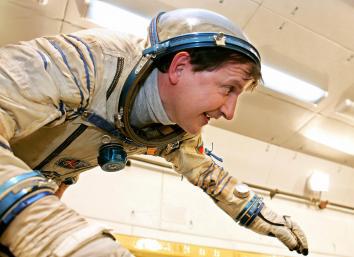The “space race” has taken on a whole new meaning in the form of reality TV.
The entertainment website Deadline announced recently that Sony Pictures Television reached a deal with Dutch broadcaster Nederland 1 to produce eight hour-long episodes of a series called Mission Milky Way, in which Dutch celebrities will participate in rigorous astronaut training, “competing” for the prize of a suborbital ride through Space Expedition Corp. Yesterday Virgin Galactic announced their partnership with Mark Burnett, producer of Survivor and The Voice, and NBC to produce a competition-based reality show called Space Race in which “everyday people compete for the ultimate prize… a life changing experience” on SpaceShipTwo. Add that to Mars One’s plans to produce yet another reality TV show—this one following applicants vying for a chance to be the first humans on Mars as they go through the interview, selection, and training process. This project will serve more as a means to finance an ambitious, what some call even impossible, project to send what Mars One calls “ambassadors” on a one-way trip to the Red Planet to establish a settlement in 2023. That project drew something on the order of 200,000 applicants.
If any actually make it into production, let alone on air, these shows might give the public microcosmic slices of what it takes to be an astronaut. But underneath, I think there is more at stake—the very definition and purpose of ways in which we commercialize space travel, more importantly, the ways in which we commercialized the stories of space travel.
We have been commercializing imaginations of space through movies and TV for a while, but it has all been fiction. Now it is about real people. Space reality TV is not actually a new concept: Burnett proposed a similar idea back in the late 1990s with a show called Destination Mir that was to follow life on the Russian space station Mir as it became privatized and trips were sold to private citizens and scientists. That didn’t happen, and now he’s trying again. I’ve never been a big fan of reality TV, especially those that serve to exploit, highlight, even sensationalize the negative side of the human condition. Personally, and as a Ph.D. student researching narratives of space tourism, I’m particularly skeptical about whether reality TV about space travel can work, but nevertheless intrigued by the potential. If done well, and without soap opera drama, these shows could bring very eloquently and intelligently the human story of space exploration, highlighting the unique and special nature of space. Reality shows that are eloquent and intelligent? I know, but I have hope.
Some reality shows actually do serve to inspire and educate others. The Biggest Loser is controversial among health and weight-loss professionals, but I have seen close friends make positive lifestyle changes as a direct result of the show. Other reality shows such as The Bachelor serve minimize the hard work it takes to create a healthy relationship. Are competition-based reality shows really the way to educate and inspire the general public about what it is like to prepare and travel to space? Is reality TV meant to be educational, let alone inspirational, in the first place? The Mars One project—though many have greeted it with skepticism—could have the benefit of making transparent the process of selecting, training, and sending astronauts to Mars. The Mars One website presents the project as focused more on the scientific and educational aspects, sharing intellectual knowledge over a game show competition format—the broadcast series is but means to achieve a dream. Good marketing spin? That remains to be seen.
On the other hand the initial description of Mission Milky Way seems to have the opposite effect. Responses from readers of Deadline’s story indicate enthusiasm and support, but only insofar as the trip for the celebrity winner is a one way trip. Commenters even offered suggested celebrity and political candidates—suggesting space is a sort of dumping ground for the unwanted. In contrast, initial comments from Virgin Galactic’s Facebook followers in response to the announcement about Space Race were positive, inquiring how to apply. One commenter added, “this is a cool way to popularize space.” Of course, it’s risky to take Internet commenters seriously, but the contrast is so stark and potentially suggests the actual role reality TV will play in the story telling process of space. Overall, I fear that that the pursuit of “good” television (good defined in terms of revenue over substantive content) would mean a focus on interpersonal drama and fudging truths about astronauts’ training and their work, which would only serve to trivialize the human experience of space exploration. I don’t think space exploration ought to join ice skating, diving, and dancing in the B-list celebrity circuit.
I believe everyone should be able to imagine themselves participating in space in one way or another should they choose, be it as tourists, scientists, engineers, artists, or something else. Space-based reality TV could be a useful tool to educate and inspire, as long as we keep our eye on the prize that highlights the strength, courage, spirit, and hope for humanity alongside the wonders of the universe over the desire to make a quick buck. The first citizen astronauts who fly suborbital, travel to the ISS, and help to settle a community on Mars will all be our role models. Their motivations, their experiences, and the way we tell their stories now can have a profound effect on the ways we think about space exploration in the coming decades. Right now, I am not sure I want to leave that up to a game show type TV show.
